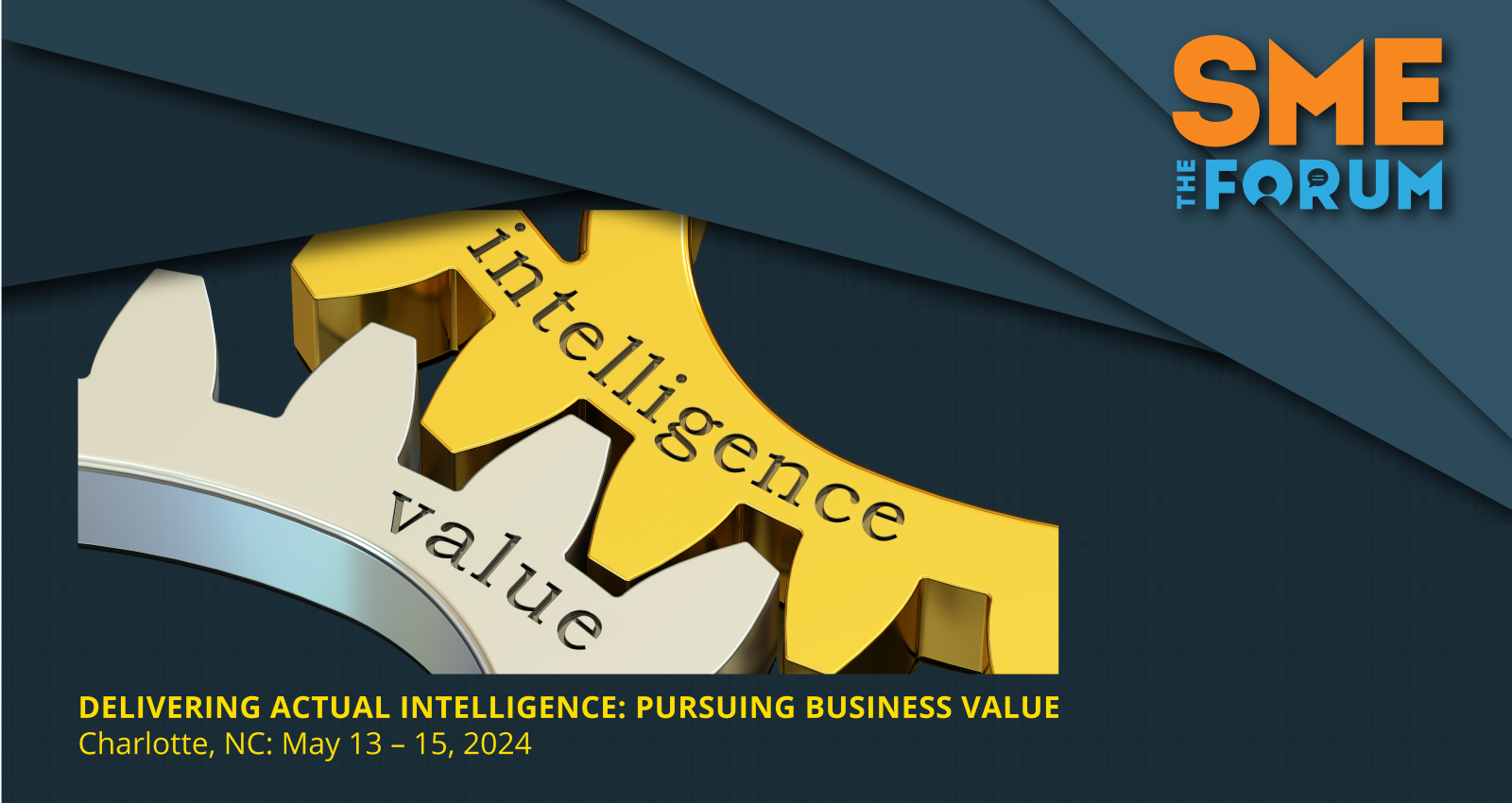Media Mentions
Delivering Business Intelligence in the Asset Management Industry
By: Bill Hortz, Founder and Dean,
(Article contains links to outside websites. All links will open in new tab)
Our explosive and frenetic Age of Data has necessitated technology-driven processes for analyzing ever-increasing torrents of information to deliver actionable insights that can guide business decisions. This driving force to easily and quickly access and actively “use” data has become more important than ever before and is further strengthening the realm of Business Intelligence (BI) as a key operating unit and function in all firms – its growing management attention, need for specialized talent, and strategic importance for firm growth, competitiveness, and customer engagement.
One asset management industry organization that is leading efforts to explore and develop business intelligence strategies and learning to effectively deploy evolving AI and ML technologies in the industry is the SME Forum (the Sales Marketing Enablement Forum) that recently hosted their 2024 Spring Forum in Charlotte entitled “Delivering Actual Intelligence: Pursuing Business Value”. Comprised of a rich community of 750 asset management and strategic vendor partner members from 75 firms, the Forum – versus a typical industry conference – is purposely designed to be an intimate “working group” where members can meet up to three times per year to share experiences, challenges, frustrations and explore potential solutions together through open discussion sessions, reviews of the latest research, and hearing from industry thought leaders and carefully chosen vendor partners in key areas in play within the industry.

“The Spring 2024 SME Forum highlighted the transformative potential of data and AI and how asset management firms are still in the early stages of exploring widespread AI usage while prioritizing information security and addressing compliance concerns. ”
While covering a broad base of asset management issues around sales, marketing, distribution, client servicing and the tools, technologies and advanced practices that enable them, there has been a significant change in receptiveness from SME Forum membership to explore how AI could be effectively applied to asset management businesses in practical and realistic ways.
“AI will be a topic and feature of almost every conversation we have going forward just as data has become so ubiquitous. BUT, it is never really about the data or AI; we are always working to ensure that we keep our eye on the ball, which is HOW data (and now increasingly AI) plays into our efforts to deliver business value and address our various business goals and objectives.” stated Hazem Gamal, Chief Operating Officer, SME Forum
The recent Forum had many energized discussions and engaged explorations of key industry topics through their Main Stage Presentations, Breakout Sessions, and Social Settings. Some highlights include:
Presentations:
Leveraging Data and AI to Win Market Share
Davis Walmsley, Head of U.S. Solutions, Broadridge discussed the external challenges facing today’s asset managers to organize around investors’ evolving needs – investors increasingly expect greater customization; the needs of heterogeneous client groups vary by strategy and delivery mechanism; investors’ needs are increasingly outcome-oriented which necessitates a holistic approach. Also, internal challenges and constraints come from the fact that high value sales resources are expensive and difficult to deploy effectively; marketing is expected to play a bigger role but must first be empowered to do so; and product teams’ efforts are stretched across management, development, and innovation. This all requires a functional alignment between sales, marketing, and product and data-driven strategy will be vital to an asset managers’ ability to adapt.
Strategic imperatives include:
- Focus sales professionals on the “right” opportunities
- Develop strategies for optimizing value-add engagement
- Develop client journey maps to tailor digital engagement
- Align resources to optimize current / future capabilities
- Integrate internal & external data into product development
Accelerating AI Adoption in Investment Management
Alec Crawford, Founder & CEO, Artificial Intelligence Risk, Inc. explained that while operations teams want AI for many reasons – create custom marketing strategies, create RFP/DDQ’s response drafts, easy advanced data visualization, summarize meetings and email chains, research and write reports, accelerate software development, and risk management of portfolios – AI needs Governance, Risk, Compliance, and Cybersecurity guard rails.
As to compliance, he stated to be aware of the SEC Predictive Analytics Rule – a 150-page Rule (proposed July 2023) to be finalized mid-2024 with many requirements in order to use Artificial Intelligence and Predictive Analytics which also mandates that firms must test the technologies before use in investor interactions and record testing results. Firm policies must describe key aspects and conflicts of interest in the technologies used. This rule covers all financial institutions – Broker/Dealers, Asset Managers, and RIAs – using predictive analytics and dealing with investors.
Crawford emphasized the need for businesses and organizations to prioritize ethics in AI development and implementation. He also discussed the dangers of AI hype and the importance of accurately representing your AI capabilities.
In predicting the future, Crawford sees 3 clear trends:
- Massive Automation – starting with DDQs, RFPs, and data; coming for trading and risk management; eventually, portfolio construction.
- Be the AI Expert – AI knowledge makes you valuable; AI will improve your job; AI will also allow for fewer employees.
- More Technical Talent – More tech talent is required; AI specialists are expensive; consider outsourcing and strategic tech partnering for some of your development efforts.
Evolving Data Talent & Structures
Loren Fox, Director of Research, FUSE Research Network outlined how in April & early May 2024, FUSE and the SME Forum conducted a data talent and structures survey with 26 asset manager members with more than $5.1 trillion in aggregate intermediary (“retail”) assets which included all products sold through advisor channels: mutual funds, ETFs, SMAs, interval funds, non-traded BDCs, etc.
Some Key Takeaways from the Data Talent Survey:
- Asset managers’ data efforts are more mature than previous years. Staffing is no longer focused entirely on acquiring and analyzing data. There are growing numbers of personnel dedicated to reporting, disseminating insights, and liaising between data and Sales.
- Firms are thinking through where data personnel should be located, rather than defer to where those teams originated. In 2018, it was common for 30% – 40% of firms to have data functions spread across multiple departments. Now, multi-department housing of one function is rare.
- Managers will partly outsource difficult functions, but complete outsourcing is rare. Firms often need vendors’ help, but they want to control what data they prioritize and how that data is mined.
- Few firms are heavily using AI to boost their efforts in data, sales and marketing…..Yet.
- Hiring continues at a mostly slow and cautious pace. Some of that is a function of firms consolidating the data-related investments they have made over the past five years, and some of that is the overall pullback in spending in the industry.
Other Main Stage presentations included:
- Panel Discussion: The Wholesaler View – co-ordinated by Lee Kowarski, SS&C
- Member Exchange: Fundamentals for AI – co-ordinated by Anthony Whitford, Olmstead
- Panel: What Could the Promises of AI be? – co-ordinated with Dennis Gallant, ISS MI
Breakout Sessions:
Use Cases across Generative AI – The session was structured to explore and discuss some of the early proven use cases for applying artificial intelligence in the Asset Management industry. Through polling and pre-Summit calls, we found that a slight majority of asset managers at session had not currently implemented Generative AI into their operations – mainly held back by management and/or compliance leader concerns – but they were all in the continuing research stage on the Generative AI learning curve.
Examples discussed included enhancing customer relationships, streamlining business processes, improving business productivity, integrating AI into products and services, AI agents, content creation, sentiment scoring, meeting note analysis, and the pros and cons of “buy vs. build” strategies.
Emerging Solutions Breakout: TIFIN AMP – To better understand how AI applications are being created and deployed, Sam Browning, Head of Strategic Partnerships at TIFIN AMP – an asset management AI distribution platform which combines marketing, data science, and sales enablement capabilities to drive more intelligent distribution – led a discussion with two of their current asset manager clients sharing their experiences working with TIFIN.
With many Forum attendees in a “pure learning mode”, they were particularly interested to see how other asset managers are working with AI technology and the use cases of where and how other asset managers are applying it. In particular, attendees were wondering how other asset management firms structured their engagement and working relationship with the AI-powered technology firm.
Some of the key take-aways from the session overall included the cautionary warning to manage your expectations since progress is not necessarily perfection but more of an iterative process with improvement developing over time. Each firm is unique and the tech platform is essentially building a personalized and customized product.
Other breakout sessions included:
- Building Next-Gen Segmentation Capabilities
- Competitive Data Sources – what has changed recently
- Creative uses of Sales Enablement Tools
- CRM Innovations to support Growth in Wealth and Institutional
- Digital Sales Rooms – Emerging Use Cases
- Marketing Key Challenges facing Institutional Sales & Marketing Teams
Conclusion:
The Spring 2024 SME Forum highlighted the transformative potential of data and AI and how asset management firms are still in the early stages of exploring widespread AI usage while prioritizing information security and addressing compliance concerns. The discussions highlighted the need for strategic AI implementation to maximize benefits and minimize risks.
Key takeaways include the importance of ensuring high data quality, simplifying data analysis, integrating AI responsibly, embedding AI into workflows, and providing continuous education. Education and skill development are vital for effective AI integration to maximize efficiency and drive informed decision-making. Embracing AI and data-driven strategies will enable firms to stay competitive and agile in an evolving landscape.

Bill Hortz
Institute for Innovation Development, Founder and Dean
Bill Hortz is a business innovation writer, independent business consultant, and Founder/Dean of the financial services business innovation focused Institute for Innovation Development.
Bill has over 30 years of experience in the financial services industry including creatively restructuring and developing internal/external sales and strategic account departments for 5 major financial firms; entrepreneurially pioneering new markets in the early days of the financial advisor fee-based movement and financial alliance programs in the US; and created many non-traditional and engaging advisor educational events with major financial firms including OppenheimerFunds, Neuberger&Berman, Peregrine Asset Management (HK), and Templeton Funds Distributors.
His wide-ranging experiences have led Bill to a strong belief, passion and advocation for strategic thinking, innovation creation, and strategic account management as the nexus of business forces needed to address a business environment challenged by an accelerating rate of change.
Bill loves working with senior executives, sales/strategic account departments, and financial advisor teams in developing effective ways of using innovation resources and developing innovation skills. He considers himself a life-long “student of human nature” and is well known for his enthusiasm, creativity, and resourcefulness.
Bill is married, with two grown children (and 2 grandchildren!), living in the Tampa Bay area. He enjoys reading, engaged conversation, bicycling, spelunking, and traveling with his family.
Little known facts: Bill worked on the last remaining docks of NYC as an underage teen, worked for the man in Hong Kong that the book Tai-Pan was based on, and constantly seeks out off-off-off broadway theatre, performance art, live music performance, and modern art museums.